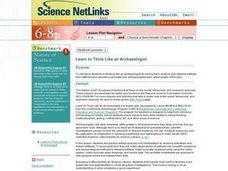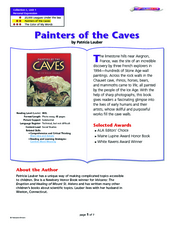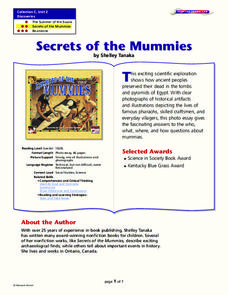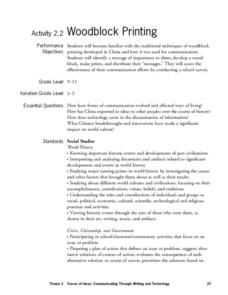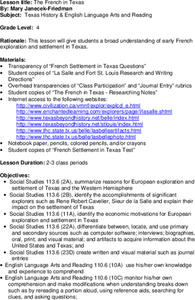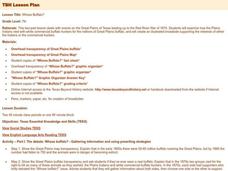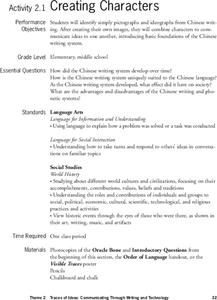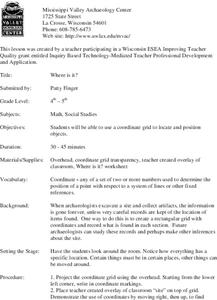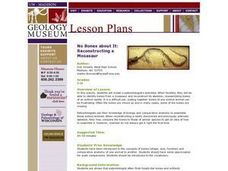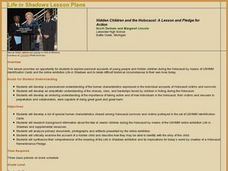Curated OER
Lesson 1: The Image of Maine in Sinclair Lewis' Babbitt
Pupils study excerpts from Sinclair Lewis, "Babbitt" for its accuracy and socio-economic point of view. They rewrite a portion of "Babbit" using the point of view of a Maine guide.
Curated OER
Leaarn to Think Like an Archaeologist
Students examine how to act as archaeologists by examining artifacts. The inquiry is meant to teach learners about analysis of ancient civilizations and scientific finds. Fossil evidence is also covered to make connection to the...
Curated OER
Mosaics
Studnets study mosaics, including the historical background of the art form. They study the cultures that have used mosaics in their art work, and then they construct their own mosaics.
Curated OER
Painter of the Caves
What a great lesson! Learners read a story called Painters of the Caves by Patricia Lauber which discusses Stone Age wall paintings in Avignon, France. There is a series of discussion questions, comprehension questions, and a graphic...
Curated OER
Secrets of the Mummies
How did the ancient people of Egypt preserve their dead so well that their bodies are still recognizable today? Learn the painstakingly complex process they used for preservation. Young scholars read and summarize a narrative detailing...
Curated OER
Oliver Twist Goes to Hollywood
How does Oliver Twist, the novel written by Charles Dickens, compare with its screenplay adaptation? Although the activity doesn't require learners to have read the novel, the similarities and differences of the highlighted passages...
Curated OER
Woodblock Printing: Early Printing Traditions in China
Students examine important role of woodblock printing in Chinese history, identify message important to them, and create woodblock prints to gain first-hand understanding of how it was used as tool for communication.
Curated OER
Shoe Box Archaeology
Students make a box layered with information about grandparents, parents, and themselves. They dig up each other boxes and try to decipher the personality or lifestyle of the person whose box it is.
Curated OER
Pharaoh Phonetics
Students explain the purpose of hieroglyphics and identify their role in communicating ideas. They research the history of writing and it's significance in ancient Egyptian life and identify the components of hieroglyphics.
Curated OER
The Ruins of Pompeii: A Window into History
Sixth graders research the history of Pompeii and its destruction. Locate important geographical features of Rome. Gain insight into the past through archaeological interpretation. Synthesize historical information through imaginative...
Curated OER
The French in Texas
Fourth graders use Internet to examine early French exploration and settlement in Texas, and write journal entries from point of view of 17th Century French settler, French or Spanish explorer, or Native American whose land was taken.
Curated OER
Whose Buffalo?
Seventh graders examine how the Plains Indians vied with white commercial buffalo hunters for the millions of Great Plains buffalo. They create an illustrated broadside supporting the interests of either the Indians or the commercial...
Curated OER
Creating Characters
Learners identify simple pictographs and ideographs from Chinese writing. They create their own images, and combine characters to communicate ideas to one another, introducing basic foundations of how elements of the Chinese writing...
Curated OER
My Secret War: Lesson 8
Fifth graders explore American history by viewing videos on the Internet. In this Japanese internment lesson, 5th graders discuss the politics that took place between America and Japan during WWII and why it was necessary to incarcerate...
Curated OER
Child Labor in the Carolinas
Fifth graders explore child labor and how children were exploited and used in the work place. In this Industrial Revolution lesson plan, 5th graders research child labor by reading, looking at photographs and drawing conclusions then...
Curated OER
Where is it?
Students use a coordinate grid. They investigate and discuss what caused certain objects to be in specific places. They choose a room in their home to map and place objects in specific locations.
Curated OER
Memories to Last: Observing Monuments
Students use scientific observation and inference to examine the Hazen Brigade Monument. In this observation lesson, students review the reasons for building monuments in society. Students then recall monuments they have seen and draw...
Curated OER
Sing Out Loud: The Slave Spirituals Historical and Cultural Implications during Reconstruction
Students identify, summarize and present facts about cultural, educational and political inequalities of Reconstruction, explain hidden codes of slave spirituals and their importance in slaves' communication, and create poetry based on...
Curated OER
No bones About It -A Mosasaur
Students model a paleontologist's activities. They identify dinosaur bones and reassemble them into a skeleton of an extinct reptile.
Alabama Learning Exchange
Do You Have a Babushka?
Young scholars retrieve information about Patricia Polacco from selected sources. They classify information into prescribed categories on a concept map.
Curated OER
Hidden Children and the Holocaust: A Lesson and Pledge for Action
Students read various personal accounts of children during the Holocaust. Using special identification cards, they relate the Holocaust to historical events in their lifetimes. Examining primary source documents, they describe how they...
Curated OER
Motel of Mysteries
Students determine that even though inferences are based on observations that does not mean they are always true or correct. They pull the topics and main ideas out of a piece of difficult text.
Curated OER
America's Favorite Landmarks
Students research using Google Earth a variety of websites to explore America's most prominent and famous buildings. They then compare and contrast architectural styles and write a position paper defending or arguing against their chosen...
Curated OER
Voyage to Freedom - What Does It Mean?
Fifth graders investigate the Underground Railroad by creating a quilt. In this U.S. History lesson, 5th graders discuss the history of slavery through a class "word splash" and by reading an Underground Railroad map online. Students...



